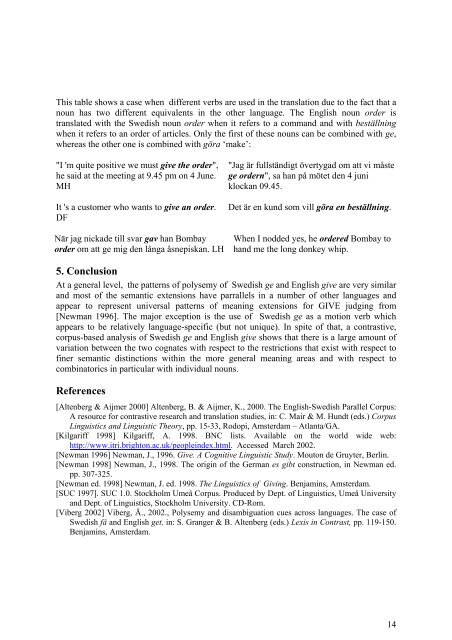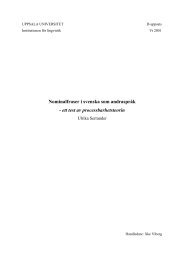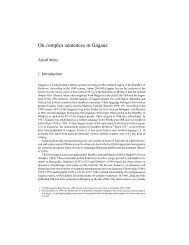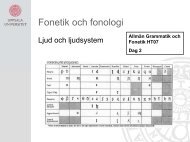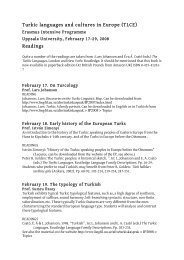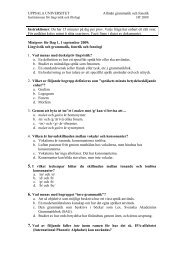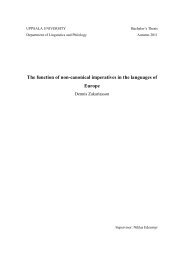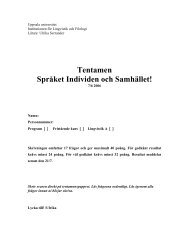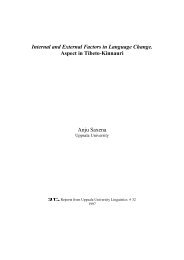The polysemy of Swedish ge 'give'
The polysemy of Swedish ge 'give'
The polysemy of Swedish ge 'give'
Create successful ePaper yourself
Turn your PDF publications into a flip-book with our unique Google optimized e-Paper software.
This table shows a case when different verbs are used in the translation due to the fact that a<br />
noun has two different equivalents in the other langua<strong>ge</strong>. <strong>The</strong> English noun order is<br />
translated with the <strong>Swedish</strong> noun order when it refers to a command and with beställning<br />
when it refers to an order <strong>of</strong> articles. Only the first <strong>of</strong> these nouns can be combined with <strong>ge</strong>,<br />
whereas the other one is combined with göra ‘make’:<br />
"I 'm quite positive we must give the order",<br />
he said at the meeting at 9.45 pm on 4 June.<br />
MH<br />
It 's a customer who wants to give an order.<br />
DF<br />
När jag nickade till svar gav han Bombay<br />
order om att <strong>ge</strong> mig den långa åsnepiskan. LH<br />
"Jag är fullständigt övertygad om att vi måste<br />
<strong>ge</strong> ordern", sa han på mötet den 4 juni<br />
klockan 09.45.<br />
Det är en kund som vill göra en beställning.<br />
When I nodded yes, he ordered Bombay to<br />
hand me the long donkey whip.<br />
5. Conclusion<br />
At a <strong>ge</strong>neral level, the patterns <strong>of</strong> <strong>polysemy</strong> <strong>of</strong> <strong>Swedish</strong> <strong>ge</strong> and English give are very similar<br />
and most <strong>of</strong> the semantic extensions have parrallels in a number <strong>of</strong> other langua<strong>ge</strong>s and<br />
appear to represent universal patterns <strong>of</strong> meaning extensions for GIVE judging from<br />
[Newman 1996]. <strong>The</strong> major exception is the use <strong>of</strong> <strong>Swedish</strong> <strong>ge</strong> as a motion verb which<br />
appears to be relatively langua<strong>ge</strong>-specific (but not unique). In spite <strong>of</strong> that, a contrastive,<br />
corpus-based analysis <strong>of</strong> <strong>Swedish</strong> <strong>ge</strong> and English give shows that there is a lar<strong>ge</strong> amount <strong>of</strong><br />
variation between the two cognates with respect to the restrictions that exist with respect to<br />
finer semantic distinctions within the more <strong>ge</strong>neral meaning areas and with respect to<br />
combinatorics in particular with individual nouns.<br />
References<br />
[Altenberg & Aijmer 2000] Altenberg, B. & Aijmer, K., 2000. <strong>The</strong> English-<strong>Swedish</strong> Parallel Corpus:<br />
A resource for contrastive research and translation studies, in: C. Mair & M. Hundt (eds.) Corpus<br />
Linguistics and Linguistic <strong>The</strong>ory, pp. 15-33, Rodopi, Amsterdam – Atlanta/GA.<br />
[Kilgariff 1998] Kilgariff, A. 1998. BNC lists. Available on the world wide web:<br />
http://www.itri.brighton.ac.uk/peopleindex.html. Accessed March 2002.<br />
[Newman 1996] Newman, J., 1996. Give. A Cognitive Linguistic Study. Mouton de Gruyter, Berlin.<br />
[Newman 1998] Newman, J., 1998. <strong>The</strong> origin <strong>of</strong> the German es gibt construction, in Newman ed.<br />
pp. 307-325.<br />
[Newman ed. 1998] Newman, J. ed. 1998. <strong>The</strong> Linguistics <strong>of</strong> Giving. Benjamins, Amsterdam.<br />
[SUC 1997]. SUC 1.0. Stockholm Umeå Corpus. Produced by Dept. <strong>of</strong> Linguistics, Umeå University<br />
and Dept. <strong>of</strong> Linguistics, Stockholm University. CD-Rom.<br />
[Viberg 2002] Viberg, Å., 2002., Polysemy and disambiguation cues across langua<strong>ge</strong>s. <strong>The</strong> case <strong>of</strong><br />
<strong>Swedish</strong> få and English <strong>ge</strong>t, in: S. Gran<strong>ge</strong>r & B. Altenberg (eds.) Lexis in Contrast, pp. 119-150.<br />
Benjamins, Amsterdam.<br />
14


